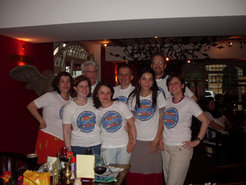Ökonomie und Ritual
Jennifer Cash
Wissenschaftliche Mitarbeiterin
Wine and Saints: Economy and Ritual in Moldova
Stephen Gudeman
Assoziierter
Chris Hann
Direktor
Nathan Light
Wissenschaftlicher Mitarbeiter
Exchange Relations, Kinship Organization and the Cultural Reproduction: Kyrgyz Rituals during and after the Soviet Union
Miladina Monova
Wissenschaftliche Mitarbeiterin
New Forms of Capitalism? House economy, ritual activities, and market practices in a Macedonian town
Detelina Tocheva
Wissenschaftliche Mitarbeiterin
Shifts in Economy and Ritual in a Village in the Rhodope Mountains, Bulgaria
Monica Vasile
Wissenschaftliche Mitarbeiterin
Forest Economy and Godparenthood in the Carpathian Mountains
Bea Vidacs
Wissenschaftliche Mitarbeiterin
From Reciprocity to Market Economy: A Hungarian Village Thirty Years On
Between 2009 and 2012, Chris Hann and Stephen Gudeman (University of Minnesota) led a group of six postdoctoral researchers who investigated the links between economy and ritual in various postsocialist regions (mostly at rural locations in S-E Europe). A provisional report on these projects can be found in the MPI Report for 2010-2011.
Starting from the premise that social relationships (sociality and sociability) underpin human livelihoods everywhere, these projects investigated the rural sectors of an ex-socialist “culture area” exposed abruptly to new forms of the market after 1990. Team members documented entrepreneurial individuals as well as intact local communities and postsocialist states, some of them now full members of the EU, struggling to defend national interests; but what they reported above all was the renewed importance of the house in the wake of the dissolution of the institutions of socialism. There can be no economy without sociality, and sociality starts with the sociability of the house, exemplified in rituals (Gudeman and Hann 2015a). A focus on self-sufficiency (Gudeman and Hann 2015b) reveals how this ideal guides economic activities in the aftermath of socialism, inside and outside the market. Taken together, these studies demonstrate the resilience of the house when an established economic order collapses and the integument of society is threatened. The two collective volumes which emerged from this project were published as the first volumes of a new series with Berghahn Books, Max Planck Studies in Anthropology and Economy.
Gudeman, S. and C. Hann (eds.). 2015a, "Economy and Ritual: Studies of Postsocialist Transformations". New York: Berghahn Books.
Gudeman, S. and C. Hann (eds.). 2015b, "Oikos and Market: Explorations of Self-Sufficiency after Socialism". New York: Berghahn Books.
The following materials provide an Introduction to this project as it was specified collectively and individually during the first year of teamwork.
Introduction

What is the relation between economy and ritual? Are they separate and opposed parts of life, or are they combined in shifting ways? We might conceive of a society in which a simple materialist calculus dictates every economic decision and no resources are allocated to unconnected activities. But no such society exists; as anthropologists have documented, humans devote time and resources to ritual and other apparently superfluous behaviors. This fact poses a challenge to standard economics and modernization theories, according to which ritual and other customs impede efficient action, the expansion of markets, and the exercise of free choice. Our project explores this relationship in six postsocialist societies by comparing their changing economic forms and rituals in the context of market expansion.
When new forms of capitalism develop in local communities, do expressive and mutual modes of behavior expand or decline? When the demands of efficiency increasingly drive material life, do social bonds and ceremonial moments deteriorate or increase? “Modernization” theorists would see ritual as an irrationality on the path to a liberal society; Marxists might see ritual as a mystification supported by the expenditure of a surplus and justified by an ideology that supports class positions. Neoclassical economists might claim that customs and ceremonies constitute “a negative externality” and friction on economic growth.
But it could also be claimed that economic motivations are heightened by the promise of social prestige gained through expenditures in support of public rituals; a more subtle argument might suggest that ritual has positive spillovers to economy by the employment it generates and the materials it requires, some of which are destroyed and must be replenished. Through the social relationships they generate, rituals also can provide a framework of trust within which self-interested trade and material acquisition may be conducted.
Other dialectical arguments point to a different connection between communal and acquisitive behavior by suggesting that ritual may transform market acts to mutuality through converting commodities and services to social transfers; rituals can bring impersonal wealth to the space of personal interaction. It might even be proposed that many economic actions are at the same time ritual acts. With this argument, the explanations come full circle: instrumental acts become expressive behavior. But this conclusion has a dark side, which is Weber’s vision that calculative action becomes its own end. Our six field sites (Bulgaria, Hungary, Kyrgystan, Macedonia, Moldova, Romania) have experienced varying economic and political influences since they ceased to be socialist. Postsocialist societies in Eurasia are unusual in the degree to which ordinary people have consciously engaged with multiple economic ideologies, and participated in the active construction and destruction of economic experiments. We will collect narratives and memories of this experimental knowledge and compare contemporary social and cultural structures of economy. The separate projects examine a variety of “rituals” including hospitality, community events, religious festivals, political meetings, work parties, family gatherings, weddings, class reunions, and godparenthood.
